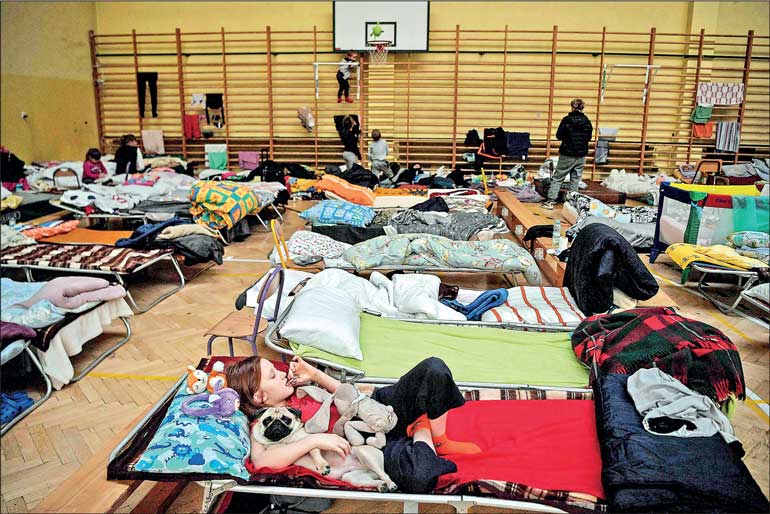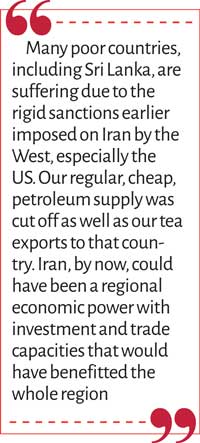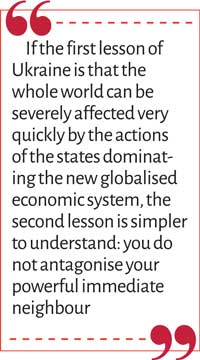Monday Feb 16, 2026
Monday Feb 16, 2026
Friday, 18 March 2022 00:00 - - {{hitsCtrl.values.hits}}

A girl rests with her dog in their temporary shelter in the gym of a primary school in Przemysl, near the Ukrainian-Polish border in southeastern Poland on March 16, 2022. - More than three million people have fled Ukraine since Russia invaded on 24 February the United Nations said on 15 March 2022 – AFP
Shells and rockets slamming down on towns and countryside – this time in Ukraine. That is, since a few weeks ago. The people of Palestine have been experiencing this and much more for more than the last seventy years! And even as the UN’s august Security Council has passed dozens of SC Resolutions (theoretically binding) on Palestine-Israel, gross violations by the originally invading and ‘Occupying Power’, Zionist Israel, over these past seven decades, has not prompted any form of punitive sanctions.
ago. The people of Palestine have been experiencing this and much more for more than the last seventy years! And even as the UN’s august Security Council has passed dozens of SC Resolutions (theoretically binding) on Palestine-Israel, gross violations by the originally invading and ‘Occupying Power’, Zionist Israel, over these past seven decades, has not prompted any form of punitive sanctions.
So what is the big deal about Russia-Ukraine? The big issue is that it is a direct ground contest between two great power spheres of influence (US-NATO and Russia), whereas in Palestine, the creation of Israel, while being a big power effort at maintaining its influence in that region, did not directly encroach on any other great power’s sphere of influence.
The Russian offensive inside Ukraine has to be assessed accurately, proportionately. Clearly, the agenda is not outright annexation of the whole country or even large swathes of territory. One can judge from the types of hardware involved, the intensity (or, notable lack) of the ground assaults, and the relatively limited scale of urban bombardment (by air, artillery, rocketry). Serious military analysts have already noted the limited scale, at least in this early phase. Western propagandists claim that the Russian offensive was piece-meal and poorly coordinated and has not been as successful as Moscow had hoped. It all remains to be seen in the coming months.
This incursion into Ukraine is not the kind of full-scale offensive meted out previously, for example, in Moscow’s internal war against the Chechen secessionist insurgency, nor the Yugoslav war conducted by NATO in Balkan Europe which aimed at fully subjugating the small ethno-supremacist Slav polities (that remain Russia’s allies). In Chechnya, despite it being a ‘sub-national’ conflict, Russian ground operations were relatively ferocious, meting out sizeable, indiscriminate, urban destruction, aimed at a quick elimination of the secessionist rebellion. In the Balkan war, NATO was relatively more discriminating, using its air power decisively but not so much its ground forces and, restricting urban destruction.
Nor is Ukraine comparable to the invasion and occupation of Vietnam by the US which was the second time ‘carpet bombing’ was used after it was first meted out against Germany and Japan during World War 2.
The current Russian military incursion is not even remotely like the scale of the NATO invasions of Iraq. The West went into Iraq with the declared aim of occupying that country and overturning the Baathist one-party regime (which was secular, modernist-reformist, like the one in Syria). Because total country occupation was intended, the NATO invasion of Iraq was, logically, of a massive scale from the very onset. The only weapons not used were nuclear although there is some suspicion that certain atomic residue-carrying ‘dirty’ bombs were used. In any case the entire invasion and years-long occupation that resulted in nearly a million civilian deaths directly and indirectly was based entirely on a pretext of ‘weapons of mass destruction’. Instead, the people of Iraq (and its foreign migrant labour population) suffered the mass destruction!
(which was secular, modernist-reformist, like the one in Syria). Because total country occupation was intended, the NATO invasion of Iraq was, logically, of a massive scale from the very onset. The only weapons not used were nuclear although there is some suspicion that certain atomic residue-carrying ‘dirty’ bombs were used. In any case the entire invasion and years-long occupation that resulted in nearly a million civilian deaths directly and indirectly was based entirely on a pretext of ‘weapons of mass destruction’. Instead, the people of Iraq (and its foreign migrant labour population) suffered the mass destruction!
Those enormous invasion operations were proudly showcased to the whole world as a demonstration of NATO/First World military power and Washington declared that the propaganda objective was to have an effect of ‘shock and awe’. The West wanted to fill not only the Iraqis with shock and awe but the whole watching world too. The combined NATO air forces were proudly reported by Western news media as having launched some 27,000 sorties (strike raids) against Iraq in the first 24-hours of the offensive. Apparently, the explosives unleashed by air raids and missiles in the first week were greater in volume than that dropped on Germany during World War 2! All this was telecast worldwide just to let people know what was coming to anyone daring to confront the West.
If one takes that ‘Shock and Awe’ as the yardstick of today’s invasive power, the Russians have yet to get down to that. Moscow is yet to unleash its most fearsome non-nuclear arsenal – from the fabled Su-35 strike aircraft to their hi-tech latest main battle tanks (Russia’s tank armies are the world’s largest), to their stable of large and small mobile missile batteries.
Russia’s aim is not total occupation but a stable (preferably authoritarian) and neutral Ukraine. Certainly not a Ukraine that is a base for weakening Russia. Russia, itself, wants to be simply left to being a prosperous, non-interventionist great power.
The last time Russia wanted to intervene anywhere was when it was part of a Communist power bloc, the Warsaw Pact, locked in geopolitical contest with the US-NATO power bloc that was historically bent on preserving its control of world capitalism. That very last time was in Afghanistan which was at a time when Soviet power was waning and new forces and threats were emerging quite independent of US-NATO.
Note that Afghanistan was not an extra-regional intervention by Moscow (as was Washington’s in Vietnam, central America, and all over the world) because Afghanistan was right on the border of the Soviet Union. Just as in Ukraine, it was a great power protecting its borders in a larger geo-political environment of rival great power threats – i.e. the Cold War. Ukraine does not even begin to approach NATO’s successive invasions of Iraq and Afghanistan.
Afghanistan.
NATO is the creature of the Cold War which was the existential contest between the dominant Capitalist bloc and the emerging Communist bloc grouped in Warsaw Pact led by the USSR. The Cold War ended with the complete dissolution of the Soviet-led Communist bloc (except for those socialist states outside the Warsaw Pact). But NATO did not shut down although Germany and Russia attempted to replace NATO with a more inclusive European security system. While the ‘enemy’ of the West/NATO became non-existent, NATO’s political leadership of the time, in fact the larger business elite class of the First World, still needed NATO as a geopolitical tool to consolidate what was wrongly presumed to be West’s total pre-eminence in the world. The US, under President George Bush Sr (a former head of the CIA) did not want NATO to be replaced by a Europe-centred continental military alliance that excluded the USA.
However, by the dawn of the 21st Century, the world economic system created by the Western capitalist powers has actually undermined that unipolar dominance by enabling new economic power blocs emerge.
After World War 2, the world thought that there will not be similar ‘World Wars’. Not because those wars were so devastating. Rather, the post-Second World War ‘De-colonisation’ process meant that the formerly imperial Western powers could no longer manipulate, abuse and devastate vast territories and large societies around the world as done during the two ‘World Wars’.
Economic globalisation has turned the world into an entirely new configuration of a multi-dimensional, Earth-wide, interdependency. This includes a one-sided dependency of poor Third World countries on First World consumption, both consumerist and industrial, as well as First World supply of high technology and manufactures. One no longer needs to be colonised in the classic European imperialist way in order to be dragged into a ‘World War’.
Many poor countries, including Sri Lanka, are suffering due to the rigid sanctions earlier imposed on Iran by the West, especially the US. Our regular, cheap, petroleum supply was cut off as well as our tea exports to that country. Iran, by now, could have been a regional economic power with investment and trade capacities that would have benefitted the whole region. Iran’s modernist (Shia) Islam could have been a stabilising counter-balance to the regressive and tribalist brand of Islam and pseudo modernity currently being exported from Saudi Arabia and the Persian Gulf states.
Iraq was a repeat and, worse, similarly affecting our tea exports there as well as reducing Sri Lankan labour migration there. Other countries were worse affected. None of these countries had any dispute with Iran or Iraq but they had to bear the brunt of Western sanctions and Western belligerence articulated by NATO.
What is happening now is far worse. While NATO and European leaders are creating a fear syndrome of “world war” in the old-fashioned sense among their own vote banks, the war in eastern Europe has already brought a new kind of ‘world war’ to the world’s poor countries whole continents away. Already the World Food Programme is warning of starvation and malnutrition in many African and poor Arab countries. There have been food riots – not in war torn Ukraine or sanctions-hit Russia but in Egypt, Sudan and Yemen, all of whom import their main cereal, wheat, cheaply from Ukraine and Russia.
In the case of Ukraine, the Western big powers grouped under NATO, began imposing sanctions against Russia even before any UN decision. Such behaviour by NATO is not new. The US, as “Leader of the Free World”, has imposed socio-economically crippling sanctions against Cuba for over half a century. 
Western big power unilateral military interventions that subsequently have negative ramifications for the mostly un-involved rest of the world, has been seen many times in the decades since the Second World War – Korea, Vietnam, Kampuchea, in Central America (Panama, Haiti, Granada), Libya, Somalia, Iran, to name but a few hapless small or weaker states.
This is the crucial difference between post-Cold War Russia and NATO. Russia has virtually no record of extra-regional military interventions. NATO, and its predecessor colonial power bloc has a long history of encircling the globe with its occupations and military bases. Right up to this day, such a global encirclement by the US and NATO powers remains and continues to be enlarged. The US’s Africa Command (AfriCom, ironically headquartered in Europe) has now bases and outposts in no less than 53 African countries. Which other power bloc maintains such a global chain of military pacts and chain of bases? None. The big question is: why should any single power bloc maintain such a militarised presence globally?
After the Cold War, Moscow under Boris Yeltsin had initially wanted to join Europe in a continental security pact. But when Washington soft-pedalled on any Russian inclusion, the Moscow elites, aware of a long history of European invasions of Russia (Prussia, France, Germany), became suspicious of this continuation of NATO led by Moscow’s biggest enemy, the US. So NATO remained, and has continued to make war globally far beyond its borders and has also expanded its European territorial footprint right up to Russia’s borders. Putin merely echoes the worries of his predecessors.
Note also that all these US-NATO interventions are against small or much weaker states that are not nuclear-armed.
Russia is nuclear-armed and the Ukrainians should have realised the implications of that factor when it comes to any geopolitical stand-off. Who wants an atomic war? Certainly not the Japanese, who have experienced it. And the US, the sole wager of atomic war, knows as much as Japan the potential for MAD (Mutually Assured Destruction).
Likewise, the rest of European NATO, knows very well the implications of big power military conflict and does not want to have ‘tank armies’ smashing through their continent.
If the first lesson of Ukraine is that the whole world can be severely affected very quickly by the actions of the states dominating the new globalised economic system, the second lesson is simpler to understand: you do not antagonise your powerful immediate neighbour.
Former Prime Minister Ranil Wickremesinghe has already publicly pointed out this lesson to poor Ukraine. And he used Sri Lanka as the example, although he did not mention the initial errors by Colombo. Originally, President J.R. Jayewardene and the UNP leadership of the time moved quickly to lean away from South Asia and tilt openly and simplistically toward Washington. At the same time, that UNP regime of 1977, thought to postpone addressing the burning issue of ethnic minority frustrations and consequent militancy. It was that combination of burgeoning Tamil rebellion with cross-border sympathies in India as well as that abrasive diminution of our neighbouring regional power’s relevance that was Sri Lanka’s ‘Ukrainian error’.
A small state adjoining a very large (and jittery) state antagonises that neighbouring power at its peril.
Sri Lanka learnt that lesson only after it was taught a bitter lesson by Delhi. Even the current, seemingly pro-China, regime in Colombo has kept its line to Delhi open and, right now, is busy begging Delhi for soft credit. As demonstrated in some recent crises in The Maldives, it is neighbouring India that can respond fast either to shore up a regime against an attempted coup (1988) or in urgent supplies of drinking water in the aftermath of the Indian Ocean Tsunami. Sri Lanka, too, has benefitted from this geographical proximity.
Most Asian countries other than direct US allies and a few small states, have not actively supported the Western-backed resolution against Russia at the UN General Assembly on 2 March.
A third lesson that the world is also learning is that of the sheer awesome terror of nuclear weaponry and its ability to deter a hard war. This deterrence has led the West to swiftly rule out direct military confrontation with Russia.
A fourth lesson is that NATO, despite its bombast, seems ready to go to direct war with only weaker, non-nuclear states. Ukraine will have to learn all these lessons and soon, if it wants peace. The whole world yearns for that peace, not any “world war”.